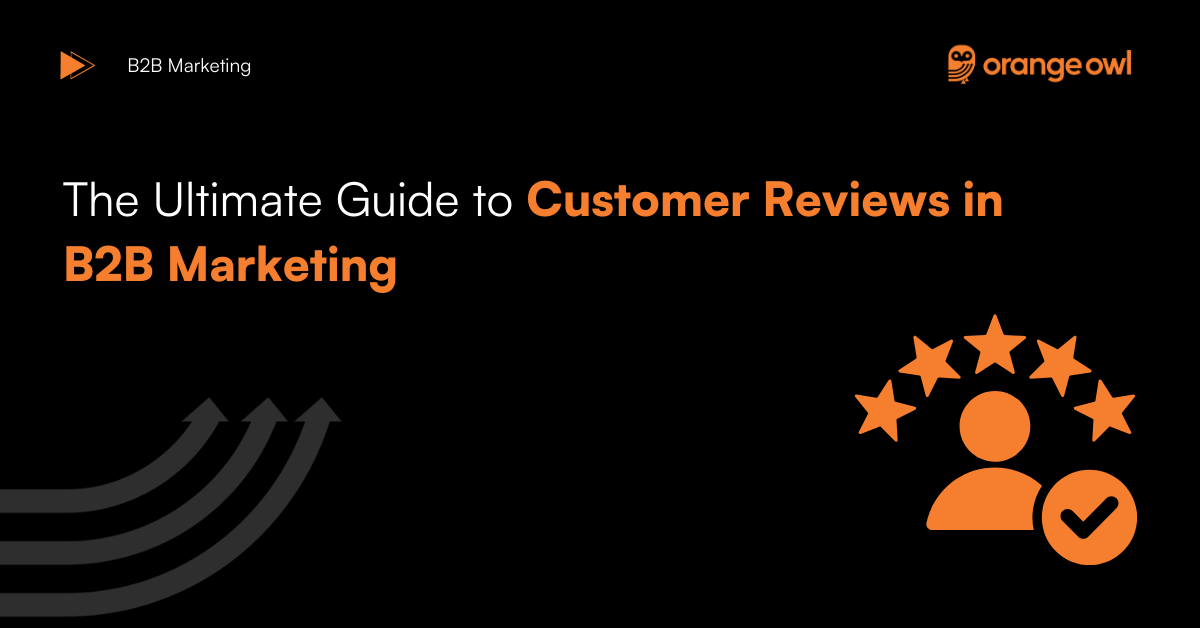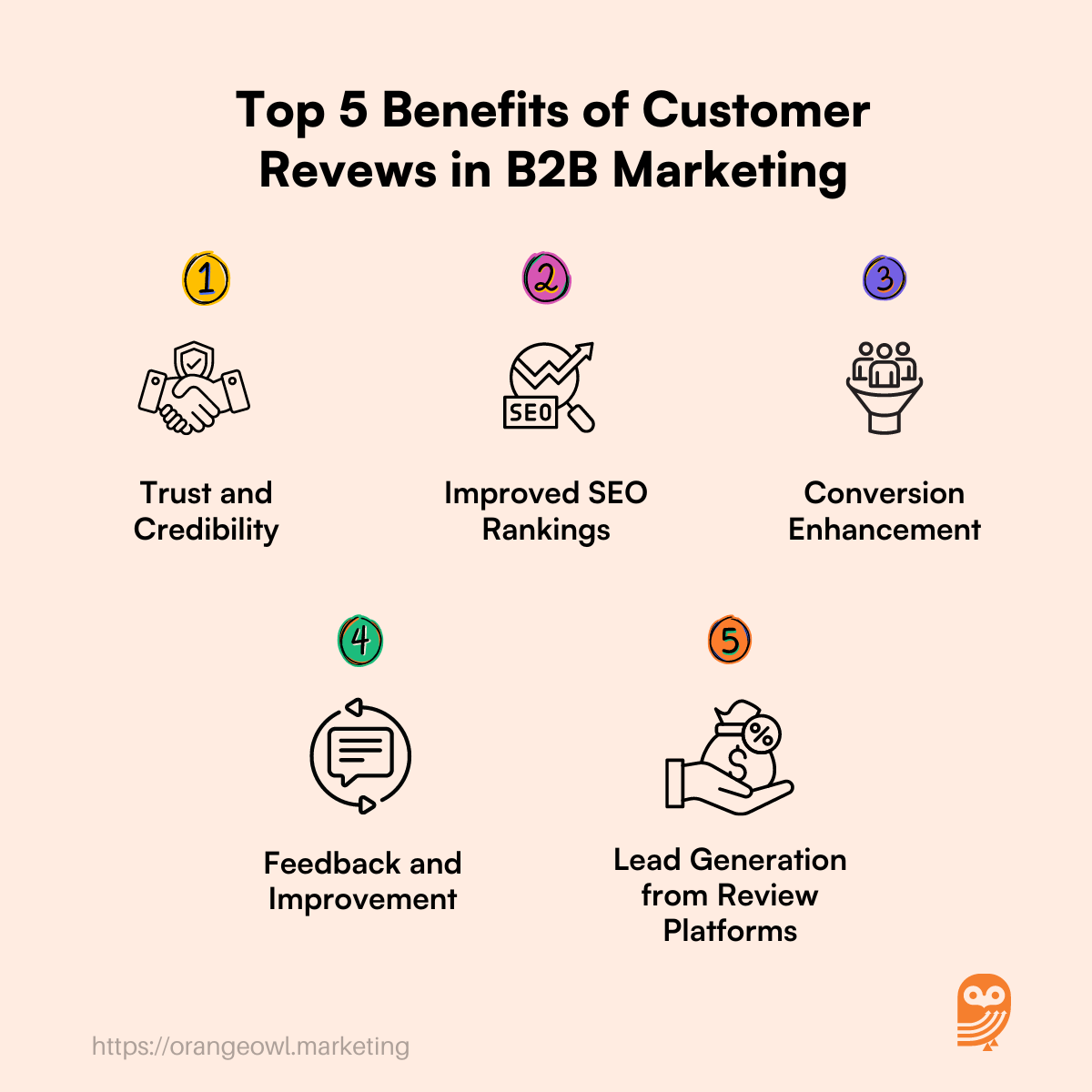The Ultimate Guide to Customer Reviews in B2B Marketing
Sreerama Murthy Tarapatla
July 23, 2024

Table of Contents
Introduction
In today’s digital age, customer reviews have become a cornerstone of marketing strategies across various industries. While the impact of reviews is often highlighted in the context of B2C transactions, their significance in B2B marketing cannot be overstated.
B2B transactions, which are typically characterized by higher stakes and longer sales cycles, rely heavily on trust and credibility. Customer reviews in B2B marketing play a crucial role in building this trust and guiding decision-makers through the purchasing process.
This comprehensive guide explores the multifaceted role of customer reviews in B2B marketing, from understanding their benefits to best practices for acquisition and management.
What are Customer Reviews?
Customer reviews are testimonials or feedback provided by clients who have used a company’s product or service. In the B2B context, these reviews often come from other businesses that have engaged with the company.
They can be in the form of written testimonials, ratings, or even detailed case studies that provide an in-depth look at how the product or service solved a particular problem. These reviews are typically published on third-party review platforms, company websites, or social media.
Top 5 Benefits of Customer Reviews in B2B Marketing
1. Trust and Credibility
Benefit: One of the primary benefits of customer reviews is the establishment of trust and credibility. In B2B transactions, where the decision-making process involves multiple stakeholders and significant financial investments, trust is paramount. Positive reviews from other businesses serve as social proof, assuring potential clients of the quality and reliability of the product or service.
B2B Example: A B2B software company receives glowing reviews from a well-known logistics firm, highlighting how the software improved their supply chain efficiency. These reviews help other potential clients in the logistics sector trust the software’s effectiveness and reliability.
2. SEO Benefits
Benefit: Customer reviews can significantly enhance a company’s search engine optimization (SEO) efforts. Reviews contribute fresh, user-generated content to the website, which search engines value highly. Moreover, reviews often include relevant keywords that can improve the company’s visibility in search engine results pages (SERPs).
B2B Example: A cybersecurity firm accumulates numerous reviews on its website mentioning specific services like “network security” and “data protection.” These keywords help the company rank higher on search engines when potential clients search for these services.

3. Conversion Enhancement
Benefit: Positive customer reviews can lead to higher conversion rates. Prospective clients who read favorable reviews are more likely to proceed with a purchase. Reviews provide a sense of reassurance and help mitigate the perceived risk associated with the purchase.
B2B Example: An enterprise resource planning (ERP) solution provider showcases reviews from various industries, demonstrating the software’s adaptability and effectiveness. Potential clients in these industries are reassured by the success stories and are more likely to purchase the solution.
4. Feedback and Improvement
Benefit: Customer reviews offer valuable feedback that companies can use to improve their products or services. Constructive criticism helps identify areas of improvement, while positive feedback highlights what the company is doing right. This continuous feedback loop is essential for maintaining high standards and meeting customer expectations.
B2B Example: A digital marketing agency receives a review pointing out issues with their reporting system. They use this feedback to enhance the system, resulting in improved client satisfaction and retention.
5. Lead Generation Through Review Platforms
Benefit: Having numerous positive reviews on review platforms like G2, Capterra, and Trustpilot can improve a company’s ranking on these sites. Higher rankings lead to better visibility, which can result in more leads and conversions.
B2B Example: A SaaS company consistently collects and manages reviews on G2. With a high volume of positive reviews, the company ranks higher in search results on G2, leading to an increase in inquiries and leads directly from the platform.
Overall Importance
Collecting and managing customer reviews is critical for lead generation, improving visibility, and establishing credibility. These reviews not only influence potential clients but also contribute to ongoing business improvement and success.
By understanding and leveraging these benefits, B2B companies can significantly enhance their marketing strategies and achieve better business outcomes.
Methods of Acquiring Customer Reviews for B2B Marketing
1. Direct Requests
One of the most straightforward methods of acquiring customer reviews is to ask for them directly. Companies can request reviews after a successful project completion or a positive customer interaction.
B2B Example: A software development firm completes a project for a client and asks for a review during their final project meeting, highlighting the value their software added to the client’s business processes.
Expert Tip: Personalize your request for a review. Mention specific aspects of the project that were particularly successful and express your gratitude for their business.
Best Practice: Time your request well. Ask for a review when the client is most satisfied, such as right after the delivery of a successful project milestone.
2. Incentivized Reviews
Offering incentives for reviews can be an effective strategy, but it must be approached with caution. Incentives should not influence the content of the reviews.
B2B Example: A consulting firm offers a discount on future services in exchange for an honest review from their clients.
Expert Tip: Ensure transparency when offering incentives. Make it clear that the incentive is for providing a review, not necessarily a positive one.
Best Practice: Keep incentives modest to avoid any perception of bias or impropriety. A small discount or a branded item can be sufficient.
3. Automated Email Campaigns
Automated email campaigns can streamline the process of requesting reviews. After a client has used the product or service for a specified period, an automated email can be sent requesting their feedback.
B2B Example: A cloud service provider sets up an automated email to be sent 30 days after a client subscribes to their service, asking for a review of their onboarding experience.
Expert Tip: Personalize automated emails by including the client’s name and specific details about their use of the service.
Best Practice: Include a direct link to the review platform in your email to make it as easy as possible for the client to leave feedback.
On-Site Prompts
Integrating review prompts within user portals or service platforms can encourage customers to leave reviews. For instance, after completing a transaction or achieving a milestone, a prompt can appear asking the user to share their experience.
B2B Example: A project management software includes a pop-up prompt asking users to leave a review after they complete their first project using the tool.
Expert Tip: Ensure that on-site prompts are non-intrusive and easy to dismiss if the user is not ready to leave a review at that moment.
Best Practice: Provide a seamless transition from the prompt to the review form to reduce friction and improve the likelihood of receiving a review.
Popular Platforms for B2B Customer Reviews
Google My Business
Google My Business is a crucial platform for local SEO and credibility. It allows businesses to manage their online presence across Google, including Search and Maps. Customer reviews on this platform can enhance local search visibility and build trust.
Trustpilot
Trustpilot is a widely recognized review platform that allows businesses to collect and manage customer reviews. It’s known for its transparency and credibility, making it a valuable tool for building trust.
Clutch.co
Clutch.co is a specialized platform for service providers and agencies. It features detailed project reviews and ratings, making it ideal for B2B companies looking to showcase their expertise and success stories.
G2 and Capterra
G2 and Capterra are essential platforms for software and services. These platforms provide detailed reviews and ratings, helping potential clients make informed decisions based on peer feedback.
Gartner Peer Insights
Gartner Peer Insights is a trusted source for enterprise software and services reviews. It provides in-depth feedback from professionals, helping businesses evaluate technology solutions.
Yelp for Business
Yelp for Business is another platform that, while traditionally more B2C, can be useful for B2B companies, particularly those offering professional services. It allows businesses to create a profile and gather customer reviews.
Facebook Business Reviews
Facebook Business Reviews allow businesses to collect reviews directly on their Facebook page. This platform is particularly useful for companies with an active social media presence.
LinkedIn Recommendations
LinkedIn Recommendations are a form of reviews that can be very influential in the B2B space. They allow professionals to endorse each other, providing a level of credibility and trust.
Software Advice
Software Advice is a platform where businesses can read and leave reviews about various software products. It’s particularly useful for companies looking for software solutions.
ResellerRatings
ResellerRatings is a review platform that focuses on customer feedback for B2B resellers. It provides insights into the reseller’s reliability and quality of service.
Common Mistakes in Managing Customer Reviews in B2B Marketing
1. Ignoring Negative Reviews
One of the most common mistakes is ignoring negative reviews. Addressing negative feedback promptly and professionally can mitigate potential damage and demonstrate a commitment to customer satisfaction.
Expert Tip: Always acknowledge the reviewer’s experience and offer a solution or next steps to resolve their issue.
Best Practice: Develop a standard response protocol for negative reviews to ensure consistency and professionalism in responses.
2. Fake Reviews
Soliciting or publishing fake reviews is unethical and can lead to severe consequences, including legal action and damage to the company’s reputation. Authenticity is key to building trust.
Expert Tip: Use review management software to identify and flag suspicious reviews.
Best Practice: Encourage genuine reviews by building a strong relationship with your clients and consistently delivering high-quality service.
3. Over-Automation
While automation can streamline the process of requesting reviews, over-automation can make the process impersonal. It’s essential to balance automation with personalized interactions to maintain a human touch.
Expert Tip: Customize automated messages to include the client’s name and specific details about their project or experience.
Best Practice: Periodically review and update automated messages to ensure they remain relevant and engaging.
Essential Tools for Managing Customer Reviews
Review Management Software
Tools like Podium, Yotpo, and Bazaarvoice help businesses collect, manage, and respond to customer reviews effectively. These platforms offer features like review generation, monitoring, and response management.
CRM Integration
Integrating review tools with CRM systems can streamline the process of managing customer feedback. This integration allows businesses to track reviews alongside other customer interactions, providing a holistic view of customer satisfaction.
Analytics Tools
Using analytics tools to monitor review sentiment and trends can provide valuable insights. Tools like Google Analytics can track the impact of reviews on website traffic and conversion rates.
Best Practices for Leveraging Customer Reviews in B2B Marketing
Showcasing Reviews
Displaying reviews prominently on the company website, landing pages, and marketing materials can enhance credibility. It’s important to highlight reviews that address common concerns and showcase the company’s strengths.
Responding to Reviews
Publicly responding to reviews, both positive and negative, demonstrates a commitment to customer satisfaction. Responses should be professional, courteous, and aimed at resolving any issues raised.
Leveraging for Sales
Incorporating customer reviews into sales pitches and proposals can provide social proof and build trust early in the sales process. Highlighting relevant reviews that address the prospect’s specific pain points can be particularly effective.
Expert Tips on Maximizing the Impact of Customer Reviews
Regular Monitoring
Regularly monitoring review platforms ensures that businesses stay informed about customer feedback and can respond promptly. This proactive approach helps maintain a positive online reputation.
Engaging With Reviewers
Building relationships with reviewers by thanking them for their feedback and addressing their concerns can foster loyalty and encourage repeat business. Engaging with reviewers also shows potential customers that the company values its clients.
Incorporating into Marketing Strategy
Integrating review insights into broader marketing strategies can enhance campaign effectiveness. For example, common themes in positive reviews can be highlighted in marketing messages, while areas of improvement identified in negative reviews can be addressed.
Conclusion
Customer reviews are a powerful tool in B2B marketing, providing numerous benefits from building trust and credibility to enhancing SEO and conversion rates. By adopting best practices for acquiring and managing reviews, leveraging the right tools, and avoiding common pitfalls, B2B companies can maximize the impact of customer feedback on their marketing efforts. As the digital landscape continues to evolve, staying proactive and responsive to customer reviews will remain a crucial component of a successful B2B marketing strategy.
Top Frequently Asked Questions (FAQs) for Customer Reviews in B2B Marketing
Customer reviews significantly impact B2B purchasing decisions by providing social proof and establishing trust. Decision-makers rely on peer experiences to gauge the reliability and effectiveness of products or services. Reviews help mitigate perceived risks associated with high-stake purchases and validate the claims made by vendors.
The optimal times to request customer reviews are immediately after a successful project completion, after providing exceptional customer service, or when a client expresses satisfaction. Timing your request when the client is most satisfied increases the likelihood of receiving a positive review.
Addressing negative reviews promptly and professionally can turn a negative experience into a positive one. Acknowledging the issue, offering solutions, and following up to ensure the client’s concerns are resolved demonstrate commitment to customer satisfaction and can improve the company’s reputation.
Customer reviews enhance SEO by contributing fresh, user-generated content that search engines value. Reviews often contain relevant keywords, which can improve search engine rankings. Additionally, higher engagement and click-through rates on review sites can boost a company’s visibility in search results.
B2B companies should respond to reviews by thanking the reviewer, addressing any issues raised, and providing follow-up actions if necessary. Personalized responses show that the company values feedback and is committed to improving customer experiences. Consistent and thoughtful responses can strengthen client relationships.
Key metrics to track include review volume, average rating, review frequency, and the distribution of ratings. Additionally, monitoring changes in lead generation, conversion rates, website traffic, and customer satisfaction scores can provide insights into the impact of customer reviews on business performance.
Customer reviews can be used in various marketing materials, such as case studies, testimonials, and social proof on landing pages. Featuring positive reviews in email campaigns, social media posts, and sales presentations can enhance credibility and influence potential clients’ purchasing decisions.
Common platforms include G2, Trustpilot, Capterra, Clutch.co, Gartner Peer Insights, and LinkedIn Recommendations. These platforms are widely used by B2B companies to collect and display customer reviews, helping potential clients make informed decisions based on peer feedback.
Best practices include prominently displaying reviews on product pages, creating a dedicated testimonial section, and incorporating review snippets in relevant content. Ensuring easy navigation to the reviews section and regularly updating reviews can enhance the user experience and build trust with potential clients.
To ensure authenticity, B2B companies should avoid soliciting fake reviews and should encourage genuine feedback from verified customers. Using review management tools to monitor and flag suspicious reviews can help maintain the credibility and trustworthiness of the reviews.


